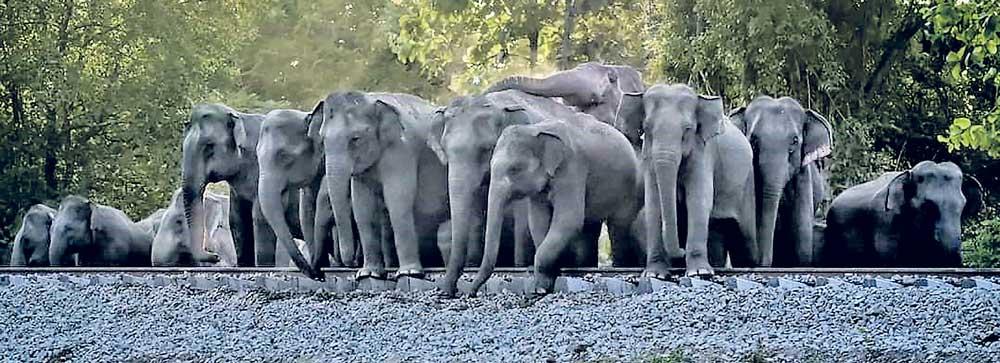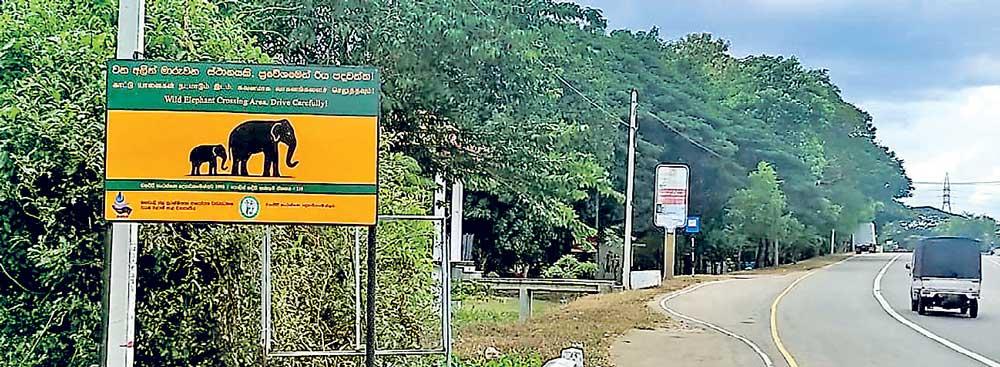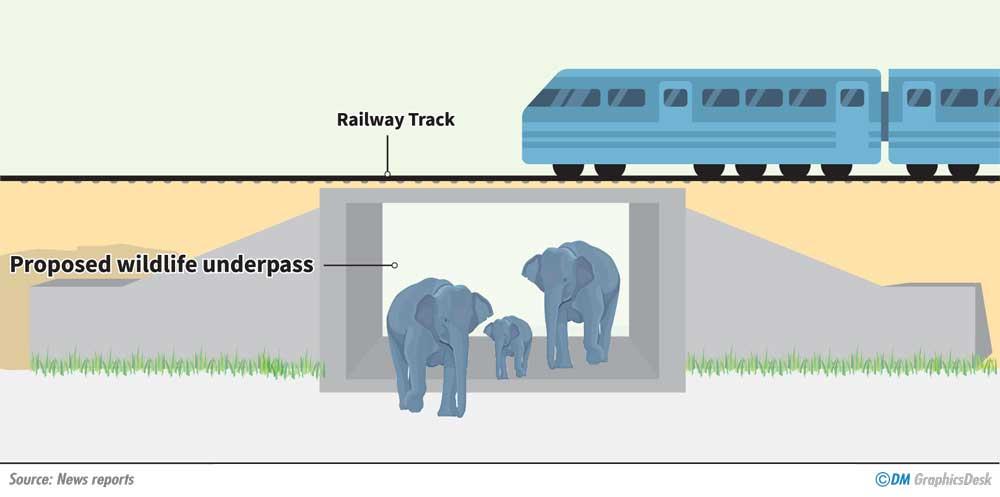Reply To:
Name - Reply Comment

Herd of elephants in Galgamuwa crossing the newly laid railway tracks - Image courtesy - Travel with Dinuka
The trampled elephant fence opposite the newly laid railway tracks in Kasikote, Galgamuwa, a remote village in Kurunegala District indicated that the herd of elephants roaming the area had gone for their morning walk. This herd of 250-300 elephants made headlines over the recent past as they were perceived as a threat for villagers and passersby. As a result, in early March, several authorities including the Ministry of Transport, Railways Department and environmentalists held a groundbreaking ceremony to put up what would be Sri Lanka’s first wildlife underpass.However, on Thursday (August 8) evening when a motorcyclist met with an accident near this elephant crossing many individuals started speculating whether this project is turning out to be another white elephant.
Constructions underway
|
The old culvert which will be extended for the proposed underpass
|
During our recent visit to Galgamuwa, the Daily Mirror learned that the construction work along the Northern railway line is ongoing. Initiated as the second phase of a line of credit project for railway track rehabilitation from Maho to Omanthai costing USD$ 91.27 million, this project is carried out by IRCON, an Indian public sector company. Officials at the project site told this paper that they were awaiting approval from authorities to initiate construction of the underpass. The plan is to extend the existing culvert into one that would allow the elephants to pass without any disturbance to people. This culvert is utilised to pass excess water that collect in Mee Oya during the rainy season. For now, a temporary ramp had been set up for the herd of elephants to cross from one end to the other.
Threat-turned-attraction
The elephant herd in Galgamuwa walk all the way from Kala Wewa, Balalu Wewa, Kekirawa, Palagala, Negampaha, Bulnewa, Res Vehera to Ehetuwewa. From Ehetuwewa they walk via Palukadawala all the way up to the Inginimitiya Lake. Even though elephants are said to be going in search of fodder in shrub forests, most forest areas in Kasikote and surrounding areas don’t provide enough food for this herd; therefore, the farmers take extra precautions to protect their harvests during paddy harvesting seasons. Even though the villagers had been trying their best to co-exist with these gentle giants, they fear for their lives. Many villagers who spoke with the Daily Mirror said that it is difficult to understand how these elephants would utilise this underpass once it has been constructed. What if they don’t use it, they questioned. For them, it is a daily struggle, having to protect their home gardens, houses and paddy lands from these elephants. The elephants are not afraid of the elephant fence either. With these conversations it was clear that these people- despite having encroached into elephant habitats, are not happy about having to live with elephants.

Signboard indicating an elephant crossing barely visible to the eye
The herd of elephants cross the railway tracks twice a day. Villagers opine that by 5.30-6.30 in the evening, many spectators gather in Kasikote to witness this spectacle.

|
Govt.’s measures to protect elephant corridors One way to ensure the safety of elephants is to protect elephant corridors. A few years ago, the Wildlife Conservation Department (DWC) planned to gazette 16 elephant corridors. When inquired DWC Director General M. G. C. Sooriyabandara said that 13 out of the 16 elephant corridors are in wildlife, forest or protected areas. “The remainder lies within Mahaweli lands and we have already held discussions with necessary authorities and have informed them about proper land use management approaches in order to continue projects without disturbing these elephant corridors.” |
Farmers await feasible solutions
K. M. Anura Bandara, a farmer from Palukadawala recalled how a lone elephant roaming the area had damaged a house the previous evening. “We usually plant paddy during intermediate seasons as well. In another one or two months we can harvest the crop. But this means we have to take extra care about the crops during this period,” he added. Bandara had opted for farming rather than going to school. He recalled how his daily pay was Rs.1.50 at the time. “Now the daily wage is Rs. 2500. Farmers have been coexisting with elephants over many years. But now there is a conflict as their habitats have been encroached. The government and respective authorities should provide feasible solutions,” he said with a betel-stained smile.
|
|
|
Indian Company approves underpass project When the project was initially launched in Galgamuwa in January this year, it was said that the project would be completed in six months. Many also question as to why there had been a delay in constructing the underpass. When inquired, Transport, Highways and Mass Media Minister Bandula Gunawardena said that the Indian Company is overlooking the project. “We aren’t using state or people’s money; therefore, we had to await their approval to go ahead with the underpass. However, they have approved the project now and construction work will commence immediately.” Speaking to the Daily Mirror, Secretary to the Ministry of Transport, Highways and Mass Media Ranjith Rubasinghe said that the date of completion of the underpass project is not yet known as there are several other factors that come into effect to determine when it would be completed. “However this underpass project had been approved within the loan scale and no additional cost is required. We have received the clearance from all parties and we will go ahead with the construction work,” he added.
-Bandula Gunawardana
|
Natural solutions to mitigate HEC
With an abundance of dense vegetation, the North Central Province is home to many herds of elephants that roam through the desolate landscape which is now being encroached by humans. But farmer communities in many villages in the North Central Province are challenged by the rising population of elephants. Passing vast greeneries and lakes reflecting the clouds above, the iconic Kala Wewa - considered to be of utmost importance to the Sinhalese civilization, spotting gigantic burutha, mara, kumbuk and Teak trees decorating the banks of the reservoir we finally reached Horiwila.
Horiwila is an ancient village in Anuradhapura District, dating back to the reign of King Datusena who constructed Soruvila, as it was initially called. Punchi Bandage Sirisena is a fifth generation farmer in Horiwila-Nika Athu Wewa who believes that organic solutions are required to mitigate HEC. “This Horiwila lake bund is inhabited by elephants. Shantha weda mahaththaya (Ayurveda practitioner) has been at the forefront in trying to implement viable solutions together with the changing regimes to mitigate the human-elephant conflict. There were elephant fences, trenches and every other proposed solution in the pipeline, but none of them have been fruitful and today, these elephants are visiting our home gardens in search of food. he said while recalling how several villagers were attacked by elephants in the past.
Sirisena recalled two instances when an elephant arrived at his doorstep. Villagers are in doubt when going to the river to have a bath. He attributes these changes in elephant behavior to climate change and rise in population. “Otherwise these gentle giants are familiar to us. I stay in a tree hut some 2-3km away but I never take the weapon issued to us by the government. We talk to them ( elephants) quite gently and they slowly turn away and go towards the lake. If elephants and farmers are to be in good terms we shouldn’t intimidate them or try to chase them away. In that case they will be aggressive towards us,”
“When my father’s generation engaged in farming practices they didn’t use weapons or dangerous tactics like hakka patas to chase away elephants. They would light up some leaves or light up a fire under the tree hut and let the smoke chase the elephants away. They didn’t go to the extent of killing elephants. Contrary to previous farming methods, present day farmers don’t leave the excess harvest for animals (also known as kurulu paluwa),” he added.
He said that it is inhumane to use lethal tactics such as ‘hakka patas’ to get rid of elephants. “The deployment of individuals with a sound knowledge of wildlife conservation would help mitigate this issue to an extent. But there is an issue in confining elephants to certain areas due to the rising population of elephants,” Sirisena said.
On the other hand, individuals like Sandeepa Malshan, representing the 30th generation of the renowned Ayurveda practitioners in Horiwila, believes that coexisting with nature is paramount.
Sandeepa and his father, Shantha Seneviratne have been advocating for solutions to mitigate the aggravating ‘Human – Elephant’ conflict in the area. Seneviratne opines that a better option would have been to provide financial incentives to farmers to protect their plots of paddy and vegetables instead of putting up elephant fences which are often defunct. “When water levels at Nika Athu Wewa drop, elephants move to Maha Wewa, but the latter is often used by humans,” said Malshan. With agriculture being the main source of income in Horiwila, farmers do everything they can to look after their paddy lands. “But we cannot stop nature. In fact I will not fight with nature and we shouldn’t stop the natural cycle of life,” Malshan underscored.